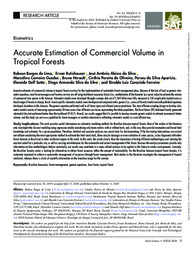Accurate estimation of commercial volume in tropical forests.
Accurate estimation of commercial volume in tropical forests.
Author(s): LIMA, R. B. de; RUTISHAUSER, E.; SILVA, J. A. A. da; GUEDES, M. C.; HERAULT, B.; OLIVEIRA, C. P. de; APARÍCIO, P. da S.; SOTTA, E. D.; SILVA, D. A. S. da; FERREIRA, R. L. C.
Summary: Accurate estimates of commercial volume in tropical forests are key for the implementation of sustainable forest management plans. Because of the lack of local or generic volumetric equations, most forest managers and forestry services are still using traditional expansion factors (i.e., multiplication of the diameter by a given value) to estimate the volume of commercial tree species in the Amazon. Volumetric models were developed through a unique data set of 1,264 fallen trees fully measured in 150 sample plots located across a broad range of forests in Amapá, Brazil. Forest-specific volumetric models were developed and compared with a generic (i.e., across all forests) model and with published equations developed elsewhere in the Amazon. The generic equation performed well in all forest types and allowed precise predictions. The most efficient sampling design to develop volumetric models consists of measuring approximately 50 trees across four different size classes representing the whole population. The form factors (FF) developed locally generated substantial bias but performed better than the traditional FF (0.7). Overall, our results suggest that it is possible to develop accurate generic models to estimate commercial timber volume, and this study can serve as a guideline for forest managers or scientists interested in calibrating volumetric models in a cost-efficient way. Study Implications: This work provides useful information on volumetric modeling methods for Brazilian Amazon tropical forests. Most of the studies in the literature only investigate the classical modeling using regression models considering only boom metrics with or without bark, and, in this way, they provide incomplete and biased total knowledge and estimates for a given population. Therefore, detailed and accurate analyzes are crucial tools for decisionmaking. If the harvesting interventions are carried out without considering the most appropriate method to estimate the total wood stock, there may be damages or even extinction of some species, as has happened with other forest domains in Brazil and in other rainforest regions in the world. In this work, the results clearly show the importance of testing different methodologies and selecting the one best suited for a particular site, as well as carrying out techniques for the sustainable and correct management of the forest. Because the analysis procedures provide only information on how methodologies behave statistically, our results may contribute to a more refined analysis to be applied in the future in similar environments. Currently, the Brazilian forestry sector is looking for alternatives to obtain forest resources within the concept of sustainability. For the Brazilian Amazon tropical forest domain, it is extremely important to achieve a sustainable management of resources through forest management. Most studies in the literature investigate the management of tropical rainforest, whereas there is a lack of scientific information on the transition range for the cerrado.
Publication year: 2020
Types of publication: Journal article
Unit: Embrapa Amapá
Observation
Some of Embrapa's publications are published as ePub files. To read them, use or download one of the following free software options to your computer or mobile device. Android: Google Play Books; IOS: iBooks; Windows and Linux: Calibre.
Access other publications
Access the Agricultural Research Database (BDPA) to consult Embrapa's full library collection and records.
Visit Embrapa Bookstore to purchase books and other publications sold by Embrapa.

